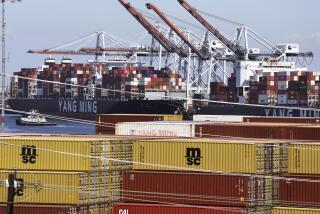U.S. and Japan Reach Accord on Air Cargo
- Share via
The United States and Japan averted a showdown over transpacific aviation rights Wednesday with an agreement expanding air cargo services by carriers of both countries.
U.S. and Japanese officials praised the agreement, to be concluded before President Clinton’s April 16-18 visit to Tokyo, as a compromise that provides increased opportunities and competition in a $10-billion market that is among the fastest-growing in the world.
The two sides had set a Sunday deadline for reaching an agreement.
“What this means in practical terms is more flying by cargo carriers on both sides,” Daniel Tarullo, deputy assistant to the president for economic policy, told a news conference late Wednesday. “It’s a very important development.”
In Japan, Vice Transport Minister Jiro Hanyu told reporters that the newly reached agreement will enable his country to achieve the “equality” in air cargo rights that it had sought for decades.
Neither side got everything it wanted. The United States sought a phased-in open-skies agreement that would lead to total deregulation of air cargo traffic across the Pacific. The Japanese government, which argues that the 1952 treaty unfairly favors U.S. cargo and passenger carriers, had wanted to expand the talks to include passenger travel.
But the two governments were under the gun to find a compromise on this sticky issue, which was one of four contentious trade conflicts threatening to mar the upcoming summit between Clinton and new Japanese Prime Minister Ryutaro Hashimoto.
The other issues are complaints about U.S. access to Japan’s film and insurance markets and the expiration this summer of the U.S.-Japan semiconductor agreement.
Tarullo said discussions on the other three issues were continuing but that there were no new developments to report.
United Parcel Service was the biggest winner on the U.S. side, gaining the ability to serve Osaka’s Kansai airport with 12 weekly flights and to operate from there to two other Asian points.
The agreement also expanded existing air cargo rights of Northwest, Federal Express and United by permitting them to serve three additional Japanese points.
Tom Martin, a Federal Express spokesman, called the agreement a “move in the right direction.” FedEx was particularly concerned that the United States not bargain away its right under the 1952 treaty to pick up cargo in Japan and carry it to other points in Asia.
Federal Express recently built a giant transshipment facility at Subic Bay in the Philippines to allow it to create an overnight express-mail service throughout Asia.
“It’s a step toward greater liberalization and we certainly support that,” Martin said.
The agreement also gives the United States the right to designate another U.S. carrier for all-cargo flights to and from Japan. The new carrier, to be selected by the Transportation Department, can operate as many as six flights a week to any destination in Japan except Tokyo.
Tarullo said he expects several U.S. carriers to compete for that designation, given the potential profit from a “beyond Japan” cargo market that is expanding at 10% a year.
Japan also won comparable new rights under the agreement.
Nippon Cargo Airlines will be permitted to increase its weekly number of flights to the United States to 18 from the current 11. It can also add three U.S. cities to the four it now serves.
More to Read
Sign up for Essential California
The most important California stories and recommendations in your inbox every morning.
You may occasionally receive promotional content from the Los Angeles Times.












